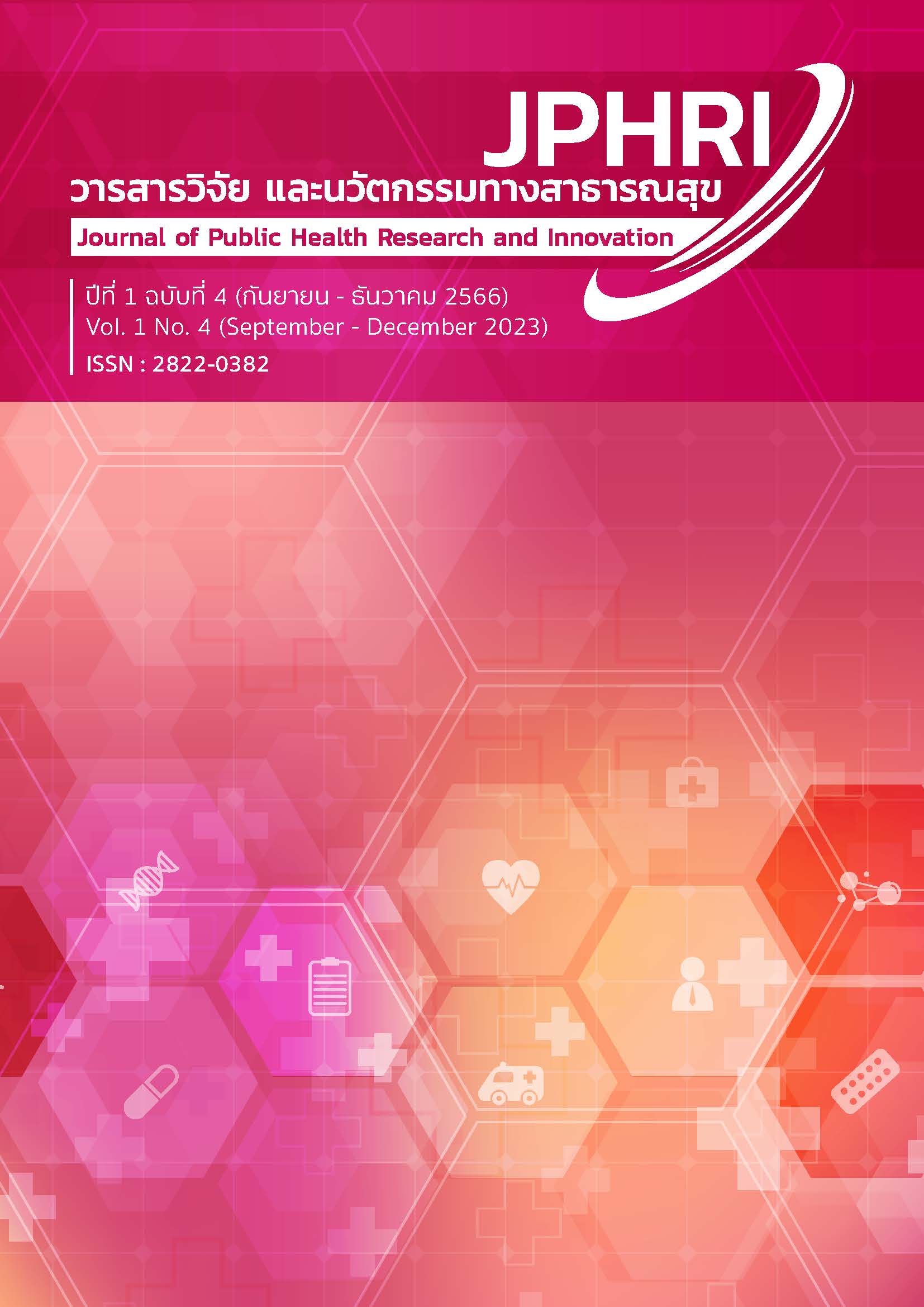ผลของโปรแกรมการจัดการอาหารร่วมกับกิจกรรมทางกายต่อระดับน้ำตาลในเลือด ของกลุ่มเสี่ยงเบาหวาน อำเภอทุ่งใหญ่ จังหวัดนครศรีธรรมราช
Main Article Content
บทคัดย่อ
บทนำ: โรคเบาหวานเกิดจากความบกพร่องของการหลั่งอินซูลินหรือการทำงานผิดปกติ ผลที่ตามมาคือภาวะน้ำตาล ในเลือดสูงเรื้อรัง โปรแกรมการจัดการอาหารร่วมกับกิจกรรมทางกายจะช่วยเพิ่มการหลั่งอินซูลิน การออกฤทธิ์ของอินซูลิน และช่วยลดระดับน้ำตาลในเลือดให้กลุ่มเสี่ยงเบาหวานได้
วิธีดำเนินการวิจัย: วิจัยกึ่งทดลองแบบสองกลุ่มวัดผลก่อนและหลังการทดลอง (Quasi-experimental, two group pretest-posttest designs) กลุ่มตัวอย่าง คือ กลุ่มเสี่ยงเบาหวานที่มีผลการประเมินค่าระดับน้ำตาลในเลือดระหว่าง 100-125 มก/ดล. แบ่งเป็นกลุ่มทดลอง จำนวน 35 คน ได้รับโปรแกรมการจัดการอาหารร่วมกับกิจกรรมทางกายเป็นเวลา 12 สัปดาห์ และกลุ่มควบคุม จำนวน 35 คน ดูแลตามแนวทางปกติ ช่วงเวลาการศึกษาเดือนพฤศจิกายน 2565 ถึง กุมภาพันธ์ 2566 เก็บรวบรวมข้อมูลด้วยแบบสัมภาษณ์แบ่งเป็น 2 ส่วน ได้แก่ 1) ข้อมูลส่วนบุคคล และ 2) ข้อมูลพฤติกรรมการบริโภคอาหารและกิจกรรมทางกาย ประเมินผลระดับน้ำตาลในเลือดด้วย Lab Fasting Blood Sugar (FBS) วิเคราะห์ข้อมูลด้วยสถิติจำนวน ร้อยละ ค่าเฉลี่ย ส่วนเบี่ยงเบนมาตรฐาน Chi- square test, Paired t-test และ Independent t-test
ผลการศึกษา: ผลการวิจัยกลุ่มทดลองมีค่าเฉลี่ยระดับน้ำตาลในเลือดลดลงจาก 116.40 (SD= 5.28) เหลือ 101.91 (SD= 4.21) มก./ดล. (95% CI= 12.05 ถึง 16.92) แตกต่างอย่างมีนัยสำคัญทางสถิติ (p< .05) ขณะที่กลุ่มควบคุม มีค่าเฉลี่ยระดับน้ำตาลในเลือดจาก 116.11 (SD= 5.62) เป็น 115.77 (SD= 6.06) มก./ดล. (95% CI= -0.40 ถึง 1.08) ไม่แตกต่างอย่างมีนัยสำคัญทางสถิติ (p> .05) และเปรียบเทียบระหว่างกลุ่มพบว่ากลุ่มทดลองมีค่าเฉลี่ยระดับน้ำตาลในเลือดน้อยกว่ากลุ่มควบคุม 13.86 มก./ดล. (95% CI= -16.35 ถึง -11.37) อย่างมีนัยสำคัญทางสถิติ (p< .05)
สรุปผล: ควรใช้โปรแกรมเป็นแนวทางดูแลกลุ่มเสี่ยงเบาหวานเนื่องจากช่วยปรับปรุงการหลั่งอินซูลินและการทำงานของอินซูลินจึงช่วยลดระดับน้ำตาลในเลือดได้ อย่างไรก็ตามควรมีการติดตามระดับน้ำตาลในเลือดในระยะยาวต่อไป
Article Details

อนุญาตภายใต้เงื่อนไข Creative Commons Attribution-NonCommercial-NoDerivatives 4.0 International License.
เอกสารอ้างอิง
Roden, M., & Shulman, G. I. (2019). The integrative biology of type 2 diabetes. Nature, 2019;576(7785):51-60.
Saeedi P, Petersohn I, Salpea P, Malanda B, Karuranga S, Unwin N, et al. Global and regional diabetes prevalence estimates for 2019 and projections for 2030 and 2045: Results from the international diabetes federation diabetes atlas, 9th edition. Diabetes Research and Clinical Practice. 2019;157:107843. Retrieved May 15, 2023 from https://www.doi.org/10.1016/j.diabres. 2019.107843
Indicators Report, Ministry of Public Health, Bureau of Policy and Strategy, Ministry of Public Health. 2022 Retrieved October 1, 2022 from https:// hdcservice. moph.go.th/hdc/reports
Moucheraud C, Lenz C, Latkovic M, Wirtz V.J. The costs of diabetes treatment in low-and middle-income countries: asystematic review. The British Medical Journal Global Health. 2019;4(1):1-12.
Ministry of Public Health. eHealth strategy, Ministry of Public Health (2017–2026). Retrieved May 31, 2023 from https://www.ict.moph.go.th/upload_ file/files/eHealth_Strategy_ENG_141117.pdf.
Phinyo P, Aphiphatkan W, Pangsuk P, Niyomsat Y, Mahem K. Effects of the North Eastern (Esan) Thai Folk Dance Exercise Program on Physical Fitness and Blood Sugar Levels in Patients with Type 2 Diabetes Mellitus. Songklanagarind Journal of Nursing. 2020;40(3):1-14.
American Diabetes Association. 6. Glycemic Targets: Standards of Care in Diabetes-2023. Diabetes Care. 2023;46:S97-S110.
Kanfer FH, Gaelik-BuysL. Self-managementmethods. En: Kanfer FH, Goldstein AP, comp. Helping people change. NuevaYork: PergamonPress. 1991:305-360.
Borisut K, Thongsumrit D, Meebunmak, Y. Effects of Health Behavior Modifying Program on Ability of Self-care among Risk Group of Diabetes Mellitus in Watphleng Subdistrict, Watphleng District, Ratchaburi Province. 2021;48(4):243-242.
CohenJ. Statistical power analysis for the behavioral sciences. Routledge. 2013.
Sarakshetrin A, Tongpeth J, Daungchan C. The Effectiveness of Health Promotion and Self-Management Support Program on
Self-Management Behavior and Clinical Outcomes among Uncontrolled Type 2 Diabetes and Hypertension Patients. Journal of Health Science. 2023;32(2):299-311.
Kotta P, Natason A, Kaewkerd O. Development of the Food Consumption Behaviors Modification Model BasedonLifestyle toPrevent Non-Communicable DiseasesAmong Adultswith Overweight and Obesity. Regional Health Promotion Center 9 Journal. 2022;16(3):799-815.
Brady TJ, Sacks JJ, Terrillion AJ, Colligan EM. Oper-ationalizing surveillance of chronic disease self-management and self-management support. Prev Chronic Dis. 2018; 15: E39.
Hughes S, Lewis S, Willis K, Rogers A, Wyke S, Smith L. How do facilitators of group programmes for long-term conditions conceptualise self-management support. Chronic Illness. 2020;16(2):104-18.
Khoonraksa S, Jard-ngoen G. Development of a Behavior Modification Process for Public Health Personnels,Bangpakong Hospital. Princess of Naradhiwas University Journal. 2021;13(2):106-124.
Subpaiboonkit P, Aungwattana S,Tamdee D. Effects of the Motivation Program on Dietary Behaviors and Blood Sugar Level Among Uncontrolled Diabetic Persons. Nursing Journal. 2021;48(4):80-92.
Khovidhunkit W, Umphonsathien M, Boonyasuppayakorn K. Effect of intermittent very-low-calorie diet on glycemic control and cardiovascular risk factors in obese patients with type 2 diabetes mellitus. Health Systems Research Institute. 2018.
Wongvasu P. The Possible Uses of Polyphenols-Rich Diets in Postprandial Glycemic Control. Journal of Food Technology, Siam University. 2020;15(1):1-14.
Wharton S, Lau D.C, Vallis M, Sharma A.M, Biertho L, Campbell-Scherer D, Wicklum S. Obesity in adults: a clinical practice guideline. Cmaj. 2020; 192(31):E875-E891.
Sanbudda T, Luenam S, Lardnongkhun S, Dana K. The effect of self-management program to glycemic control in type 2 diabetes patients: COVID-19 relief measures. Academic Journal of Health and Environment. 2023;1(1):531-531.
Phinyo P, Aphiphatkan W, Pangsuk P, Niyomsat Y, Mahem, K. Effects of the North Eastern (Esan) Thai Folk Dance Exercise Program on Physical Fitness and Blood Sugar Levels in Patients with Type 2 Diabetes Mellitus. Songklanagarind Journal of Nursing. 2020;40(3):1-14.
Santisevi S., & Sirikajon, S. Effects of Functional Training on Blood Biochemical Parameters and Physical Fitness in Adults with Prediabetes. Chulalongkorn University Theses and Dissertations (Chula ETD), 9470; 2022.
Sathayasomboon P, Sroisong S, Foungtong P, Kaewtunkham K. Effects of Self-management Program on Level of Blood Glucose among Patients with Type 2 Diabetes. Journal of Graduate Studies Review MCU Phrae. 2022;6(1):166-181.


